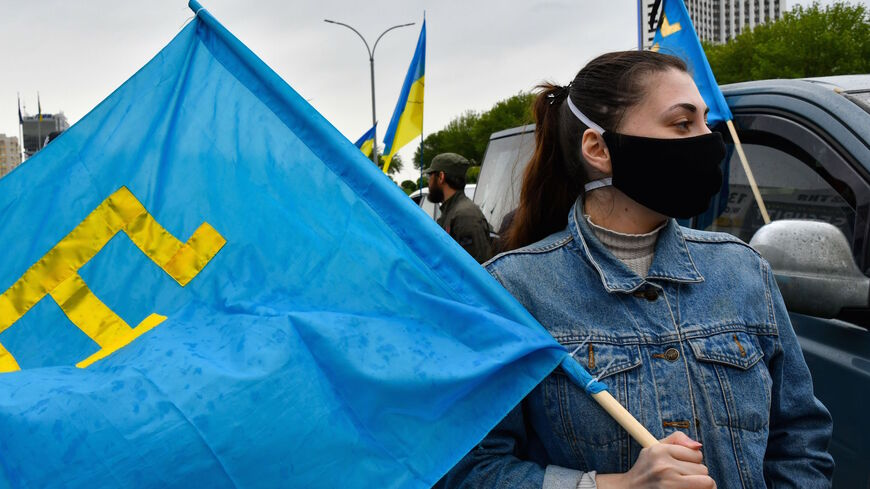
Complex ties stretch across centuries and continents, but Turkey’s affinity for its ethnic kin is taking a backseat to global relations with Russia.
Ilmi Umerov, a Crimean Tatar political leader, was lying on a hospital bed in Simferopol, the capital of Crimea in his pajamas when Russian secret service agents carted him off to the airport and put him on a plane to Ankara with fellow Crimean Tatar political detainee Ahtem Chigoz.
The dissidents were freed on Oct. 25, 2017, in exchange for a pair of Russian operatives held in a Turkish jail for their alleged role in the murders of seven Chechen dissidents between 2000 and 2015. The swap was engineered by Turkish president Recep Tayyip Erdogan. “He is such a sultan,” Umerov said of Turkey’s authoritarian leader, whom he met the day after his release. “I mean in a good way.”
Erdogan came together with Ukraine’s president Volodymr Zelensky for three and half hours in Kyiv today offering to mediate once again between its Black Sea neighbor and the Kremlin. Speaking at a joint news conference, Erdogan stressed the importance of diplomacy in defusing the crisis between the two countries. “Rather than pouring oil on the flames, we are acting with the logic of how can we cool tensions,” he said.
The two leaders signed a long-delayed free trade agreement and another to expand production of Turkish-made drones that Ukraine used against Russian-backed forces in the Donbas for the first time last year. The plight of Crimean Tatars, who form “a historical bridge of friendship between our two countries,” had also been raised. “We continue to support the sovereignty and territorial integrity of Ukraine, including Crimea. Common projects involving our ethnic [Crimean Tatar] kin were evaluated in detail,” Erdogan said.
As expected he received leaders of the Crimean Tatar parliament in exile, known as the Majlis, including the legendary Mustafa Jamilov.
Ukrayna ziyaretimizden bir kare. Kırım Tatarlarının efsanevi lideri Mustafa Ağa’yla... pic.twitter.com/NaWhhc9ab2
— Ibrahim Kalin (@ikalin1) February 3, 2022Turkey’s presidential advisor Ibrahim Kalin posing with Crimean Tatar leader Mustafa Jamilov, Kyiv, Feb. 3, 2022.
Turkey has firmly backed Ukraine over Crimea since Russia annexed the peninsula in 2014, despite fierce resistance from its indigenous Tatars. The Sunni Muslim group who speak a dialect of Turkish have been reduced to minority status following centuries of repression and mass expulsions. Turkey does not recognize the annexation and has repeatedly called for Crimea to be returned to Ukraine. It treats leaders of the Majlis, which was banned by Russia, as formal interlocutors.
“For Turkey, Crimea is Ukraine, and Crimean Tatars are citizens of our state. Thanks to Turkey, several political prisoners have been released from Russia’s illegal detention. Turkey has co-authored an array of UN General Assembly resolutions that urge Russia to get away from Ukraine’s Crimea, condemn Russia’s human rights violations in the occupied territories and call it to immediately halt and remedy them,” said the Ukrainian foreign ministry in a written response to Al-Monitor’s request for comment. The ministry added that in 2021, Turkey became one of the founding members of the Crimea Platform, devised to drum up diplomatic support for the Crimean question and that held its first summit in August last year.
The potential showdown over Ukraine is a further test of Erdogan’s trademark brinksmanship, which triggered US sanctions through his acquisition of Russian S-400 missiles and Moscow’s simmering wrath with the sales of combat drones to the Ukrainian military.
But amid the shows of solidarity, Ankara’s Crimean stance illustrates like few other the limits of Turkey’s willingness, let alone ability, to cross Russia in its own back yard.
Turkish officials argue that neutrality is what enables Ankara to pull off deals like the 2017 prisoner trade and may allow for Turkish mediation to avert conflict. The Kremlin announced that Russian president Vladimir Putin was expected to travel to Ankara on an official visit some time after the Beijing Olympics.
On Tuesday, Turkey’s defense minister, Hulusi Akar, stressed Ankara’s commitment to the 1936 Montreux Convention, which limits the passage of US and other non-Black Sea nations’ warships through the Turkish straits in and out of the Black Sea. His comments were seen as a bid to reassure Moscow that Turkey had no plans to change the rules to suit any Western military plans to counter Russia, ahead of Erdogan’s visit.
